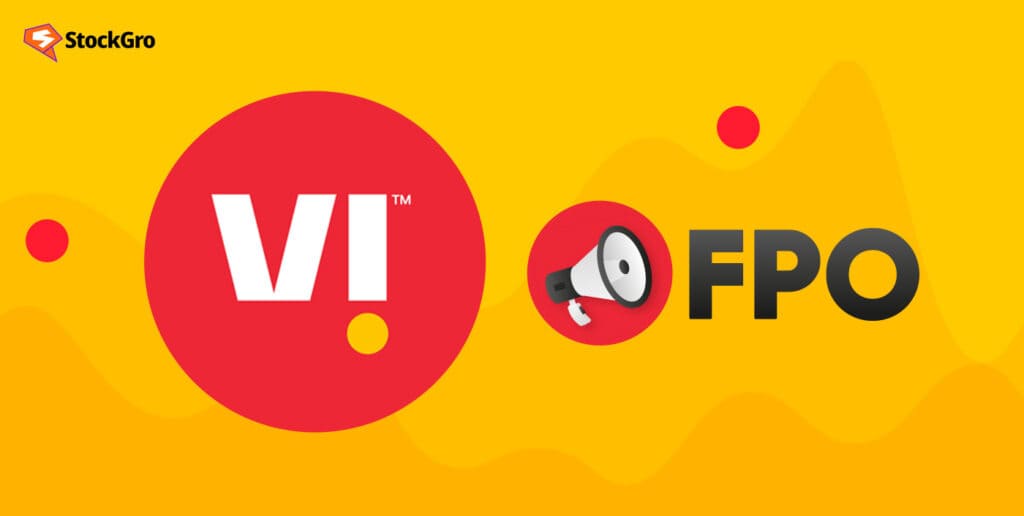
The Indian telecom industry is known for its intense competition along with technological advancements. In such a scenario, it is now about to witness a significant development as Vodafone Idea has announced a ₹18,000 crore FPO (Follow on Public Offer), which is possibly the largest FPO in India to date.
Priced between ₹10-11 per share, the FPO represents a crucial move for the company to strengthen its financial position and achieve its plans for network expansion across India.
With the telecom landscape constantly evolving, Vodafone Idea’s FPO could be a game-changer against big names like Bharati Airtel. That said, let’s look at what Vodafone Idea has on its sleeve and what this move means for the company and the shareholders.
About Vodafone Idea
The Indian mobile network provider Vodafone Idea, often known as Vi, has headquarters in both Gandhinagar and Mumbai.
Among India’s many telecommunications companies, Vodafone Idea is among the most prominent. In addition to voice business/services, broadband services, content services, enterprise services, and other VAS products, including entertainment, SMS, utility, etc.
Two distinct brands, Vodafone and Idea, were run by Vodafone Idea Limited until September 7, 2020. Both brands offered GSM service, both prepaid and postpaid.
The Indian government became the largest shareholder in the company on February 3, 2023, when it instructed the company to convert its interest debts totalling ₹161.33 billion into equity at a rate of ₹10 per share, which was significantly higher than the market value (approximately ₹8.5) at the time.
Vodafone Idea news: New ₹18,000 crore FPO from Vodafone Idea
Vodafone Idea said on April 12, 2024, that it intends to sell up to ₹18,000 crore worth of shares in the largest follow-on public offering priced between ₹10 and ₹11 each. Using the recently authorised preferential issue price of ₹14.87 per share as a benchmark, Vi shares are being sold at a discount of around 26% at the top of the pricing range.
The five-day offer, according to the Aditya Birla Group firm, will begin on April 18th, while anchor investors will have access starting on April 16th. Qualified institutional purchasers typically get 50% of FPO shares, while ordinary investors often receive 33% to 35%.
For over three years, Vi has been dealing with the shortage of funding in India’s capital-intensive and highly competitive telecom industry. This has caused several problems, including a declining user base and earnings.
Also read: Telecom industry in India: An overview of growth and opportunities
To strengthen its financial position and compete with strong competitors like Bharti Airtel and Reliance Jio Infocomm, the telecom company has made this decision. This is going to be the largest FPO in India if it is successful, much bigger than YES Bank’s ₹15,000 crore share offer in July 2020.
The FPO is expected to attract investments of around ₹4,200 crore from US-based GQG Partners and ₹1,700–2,500 crore from SBI Mutual Fund. To acquire 4G and 5G network equipment, the corporation would invest ₹12,750 crore. Additionally, they will allocate ₹5,720 crore to establish new 5G sites and enhance its current 4G infrastructure.
In the following two fiscal years, investments will be made to establish 10,000 new 5G stations in FY25 and 12,000 new sites in FY26. Along with meeting operating capital needs, the remaining funds would be used to settle ₹2,175 crore in outstanding spectrum payments from FY25.
Vodafone Idea results
The telecom company Vodafone Idea said in January 2024 that its net loss for Q3FY24 ended December 31, 2023, was ₹6,985 crore, down from ₹7,990 crore at the same time last year. After 11 consecutive quarters of record-high EBITDA, the firm finally broke through in the most recent quarter, reporting ₹21.4 billion.
After reaching 121.6 million in Q3FY23, the telecom company’s 4G customer base surged to 125.6 million in the December quarter of FY24. After reaching ₹2,000 crore in Q3FY23, EBITDA for Q3FY24 increased to ₹2,140 crore, a 6.8% year-on-year growth.
Also read: Connecting communities: A mobile broadband case study
Financials
As of April 13, 2024, Vodafone Idea’s share price is ₹13.15, which is 9.58% up in the last 6 months and increased 117% over the past year.
| Metric | Value as of April 13, 2024 |
| Market cap (₹ Cr.) | 63,040 |
| Book value (₹) | -18.7 |
| ROCE | -3.82 % |
| EPS | ₹ -6.16 |
Shareholding pattern
The shareholding pattern (as of December 2023) of Vodafone Idea is as follows:
| Promoters | 50.36% |
| Foreign Institutional Investors (FIIs) | 2.27% |
| Domestic Institutional Investors (DIIs) | 36.23% |
| Public | 11.14% |
Competitor information of Vodafone Idea
| Company | Market cap(₹ crores) | ROCE | Net profit in 2023(₹ crores) |
| Bharti Airtel | 706,765.38 | 12.30% | 11,535 |
| Tata Communications | 55,445 | 39.8% | 1,766 |
| MTNL | 2,308.95 | -7.04 % | -2,916 |
Also read: Jio Financial Services: Disrupting the insurance and AMC markets
Investing in Vodafone Idea
Pros
- Funding for growth:
Funds from the FPO will go towards launching 5G technologies and expanding 4G services. Vodafone Idea may be able to strengthen its position in the market and compete more effectively with other telecom companies, which might boost its market share and revenue.
- Investing opportunity at an affordable price:
Investors seeking to join or increase their position in the telecom industry would find the FPO’s price tag of between ₹10-11 per share to be relatively affordable. Investors looking for value purchases may be interested in this pricing since it is lower than the market price of ₹13.15 as of April 13, 2024.
- Historical performance:
The stock price of Vodafone Idea has increased dramatically during the last 12 months, more than doubling. Telecom bulls may find this pattern appealing since it may signal the company’s recovery and future growth prospects.
Cons
- Financial difficulties:
Significant debt of ₹2.15 trillion, as of Dec 31, 2023, has been a problem for Vodafone Idea, raising questions about the company’s financial health. Even if the FPO’s performance is critical to the company’s financial recovery, its profitability in the cutthroat telecom industry is still uncertain.
- Pressure from competitors:
With established giants like Bharti Airtel and Reliance Jio, competition in the Indian telecom market is fierce. Even with the FPO funding, it is still uncertain whether Vodafone Idea can implement its 5G plan and position itself as a market leader in the coming years.
Conclusion
Vodafone Idea has reconsidered its products and services and put more emphasis on competing better in the market and meeting the changing demands of its clients.
To finance the necessary investments for network growth, including the implementation of 5G, they are actively engaging with different stakeholders in the fundraising process, like the upcoming FPO.
However, whether this fundraising succeeds in reviving Vodafone Idea’s fortunes will depend on how well the company adapts to changing market conditions and meets customer needs.
